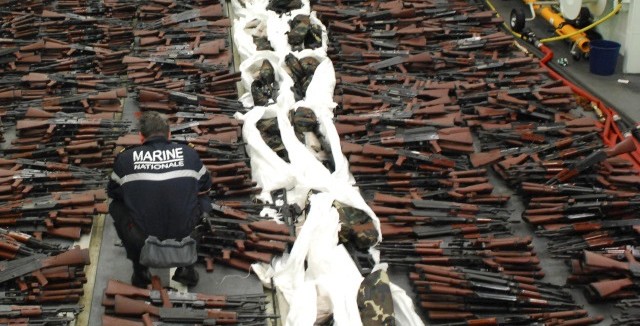A large arms shipment intercepted in the Indian Ocean by French naval forces earlier this month originated in Iran, the United States Navy has said.
Cmdr. Kevin Stephens, a spokesman for the Navy’s Fifth Fleet, told CNN that the weapons were likely destined to go to Yemen by way of Somalia, though he would not indicate whether they were headed to Iran-backed Houthi rebels.
French authorities affiliated with the multinational Combined Maritime Forces (CMF) intercepted the arms shipment on March 20. After a helicopter from the French battleship FS Provence spotted an unmarked dhow in the northern Indian Ocean, French forces searched the ship and discovered “several hundred AK47 assault rifles, machine guns and anti-tank weapons,” according to the CMF. The weapons were determined to have been headed to Somalia and then seized in line with United Nations Security Council resolution 2244, which prohibits the shipment of arms to the country.
A similar shipment, also believed to be headed to Yemen by way of Somalia, was intercepted in February. Stephens said that this is the third such weapons seizure since September.
If the American assessment that the French-seized shipment originated in Iran proves correct, it “would provide another example of forces inside Iran stoking sectarian tensions in the Middle East,” according to CNN.
Vice Admiral Kevin Donegan, the recently installed commander of the Fifth Fleet, said in November that since the nuclear deal with Iran was announced last summer, the Islamic Republic’s “malign behavior” in international waters had not changed.
In Iran and Its Terror Proxies: A Guide to a Dangerous Future, which was published in the August 2015 of The Tower Magazine, Jamie Kirchick noted Iran’s support for the Houthis.
As recently as April, Secretary of State John Kerry acknowledged that Iran has been sending “a number of flights every single week” to supply arms to Houthi rebels—Shi’a Muslims—fighting an insurgency against the government of Yemen, in spite of a United Nations Security Council resolution calling for an arms embargo against the uprising. A month earlier, an Iranian cargo ship is reported to have unloaded some 180 tons of weaponry to the Houthis. Military support has included such sophisticated weaponry as surface-to-air missiles, explosives, and rocket-propelled grenades.
A senior Iranian official boasted after the Houthis seized the Yemeni capital of Sana’a in September 2014 that the Islamic Republic had captured its fourth Arab capital. The other three were said to be Beirut, Damascus, and Baghdad, capitals of countries that are now dominated by Iranian allies or militias.
[Photo: Combined Maritime Forces ]




